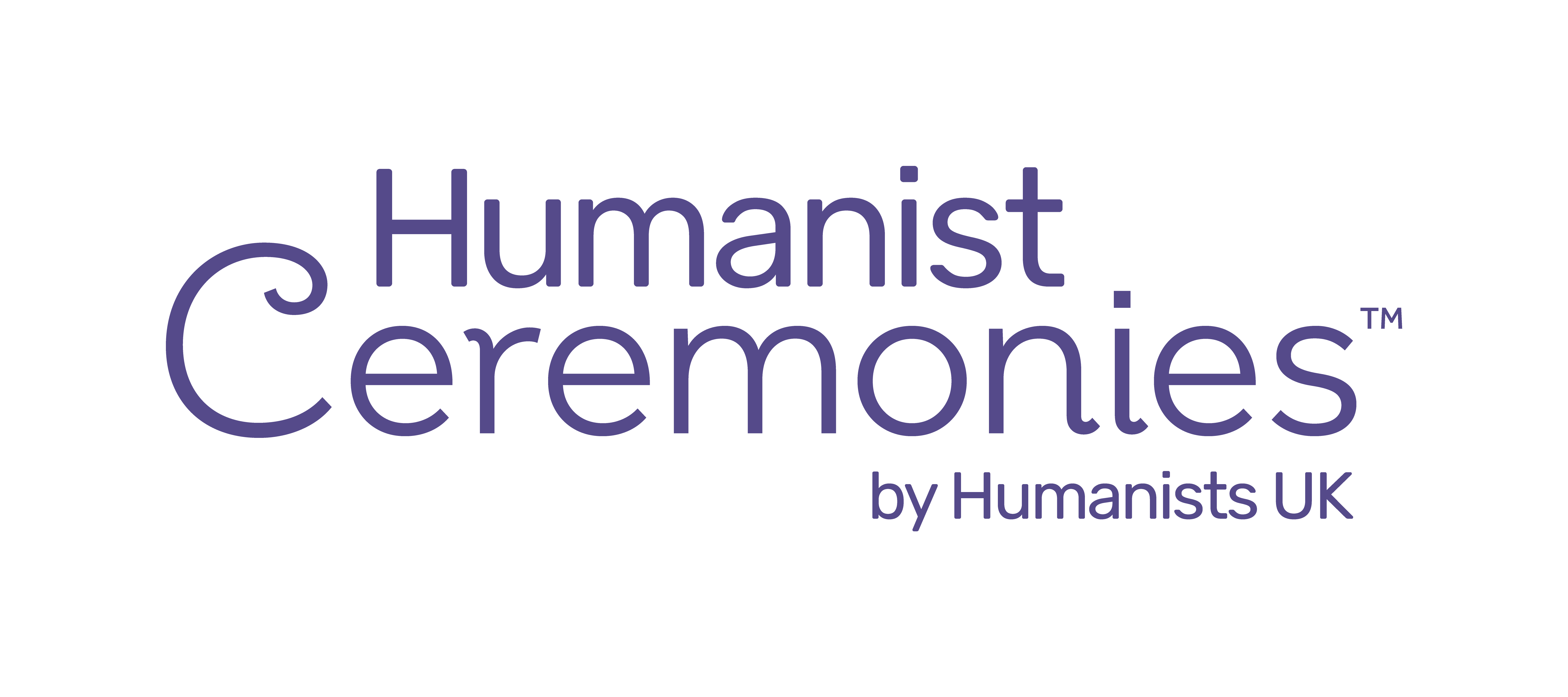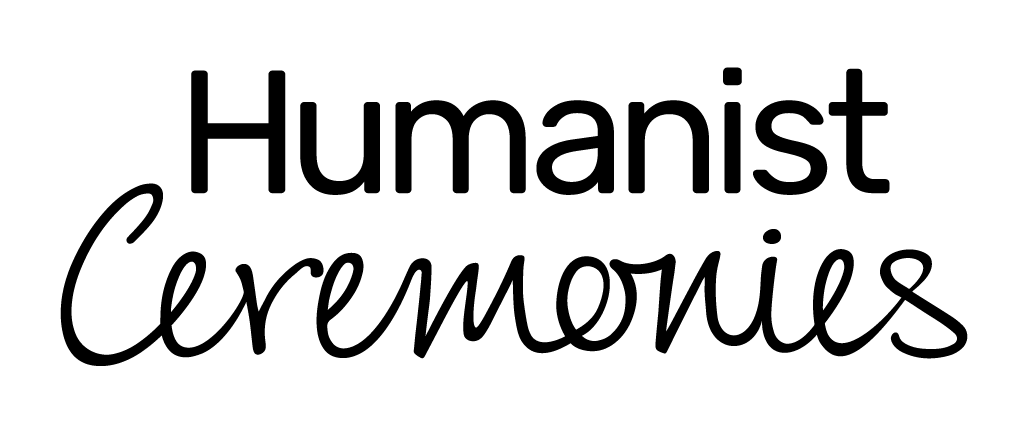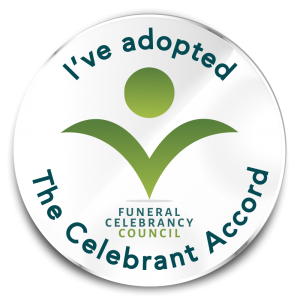Planning a Funeral
On this page –
- Planning a Funeral
- FAQs (Frequently Asked Questions)
- What Goes into a Ceremony
- My Fee
- Types of Ceremonies
- Why Do I Take Funerals?
- Funeral Director List
Planning a Funeral
Planning a Funeral can be a difficult and stressful time. I do my best to make the process as smooth and easy as possible, whilst allowing you to have control of the things you want and the things that will happen in the ceremony.
A funeral is about remembering and celebrating the life of the person who has died; the life they lived, the things they did and the people who loved them.
I will meet you and find out about the deceased person and to find out what you want for the funeral. I set no time limits and the meeting can take as long as is needed – if you wish, I am happy to visit you more times. If you’re not sure exactly what you want, I can help with ideas and suggestions.
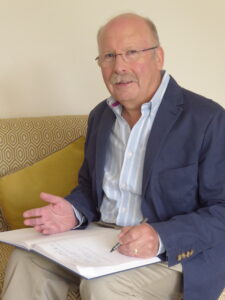
Mark Taylor at a Family Meeting
Then I write the ceremony, following your instructions.
The Tribute is the main part of the ceremony and I share it and other parts with you so that you can comment and change anything.
Ceremonies can have music, poetry, readings and include other people; all according to your wishes – it’s whatever you want.
Before the meeting, it may useful if you have thought about the music you might like, along with any readings or poetry and whether you would like other people to speak. It doesn’t matter if you haven’t because we can chat about all those things.
* * *
What goes into a Funeral Ceremony?
… the simple answer is; whatever you like.
The usual format is; a few Introductory Words, then sometimes there will be a poem or reading and then the Tribute, the story of the life of the person who has died. I usually write and read the Tribute but it may be something that you or someone want to write and read – whatever you choose.
Other parts of the ceremony are written around the Tribute. There may be music, poems or readings. Other people may want to speak, sing or play music, or anything else. There hasn’t been dancing at any of the ceremonies that I’ve taken so far but I would never say ‘Never!’ All the things you choose and decide.

A Dandelion Clock
Many crematoria can show photographs or videos – talk to me or the funeral director and see what can be done – a photo tribute can be lovely, showing the special person at all stages through their life.
There will usually be a Committal, when we say goodbye to the deceased. At a cremation, the curtains close (you may not want the curtains to close – it’s your choice). At a burial, the Committal is when the coffin is lowered into the ground. This is usually a very emotional point in the ceremony.
There will then be some Closing Words and then the ceremony ends.
* * *
I also talk to the Funeral Director (see a list below of the ones I work with most frequently) to ensure that everything is ready and prepared. They order the music and if they are printing the Order of Service, they need to know what headings will be needed. If you are arranging the printing, then I work with you on that.
The Music that you choose can be anything you like – there are no rules. Usually three pieces but there can be more. One piece to go into the chapel at the start – often something gentle or reflective, one piece for the committal – often something that is special for the deceased person and one piece at the end to leave the chapel – often something a bit lively or upbeat.
The choice is entirely up to you.
Ceremonies may include Live-Streaming over the internet, usually by arrangement with the funeral director or crematorium.
* * *
My Fee for almost all ceremonies is £230, irrespective of the number of visits I might make to see you or the length of the ceremony.
For shorter ceremonies, such as Interment of Ashes, I may charge a lower fee. If the ceremony and visits are out of my local area – usually measured as an hour’s drive, I may ask a slightly higher fee to reflect the cost of travelling.
* * *
Types of Ceremonies
What Types of Ceremonies Do I Take? – I take Cremations, Burials, Memorials, Ashes; both Scattering or Burial.
I also take Virtual Ceremonies and draw up Pre-Planned Funerals.
* * *
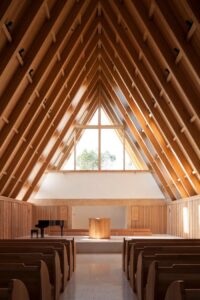
Modern Crematorium
Cremations – Most Cremations ceremonies will be at a Crematorium. Usually around thirty minutes, although this varies with different crematoria. Double time-slots can be arranged. Talk to the funeral director about these.
The ‘Committal’ is the point in the ceremony when we acknowledge the final parting and say goodbye. It can be a very emotional moment. According to your choice, the curtains will close or may remain open. Some crematoria have a slightly different arrangement.
The ceremony does not need to be at a crematorium – it could be a hall or other place, arranged by the family. After the ceremony, the coffin may be taken to a crematorium for a brief ‘Dedication’, or simply a ‘Direct Cremation’ taking place without further ceremony.

Blossom Lined Cemetery Drive
Burials – Burials may be at the local cemetery or at a green burial site. Green Burial Sites are a woodland or other place designated for burials. They can be lovely places.
Cemeteries sometimes have a chapel for the ceremony but usually this will be at the graveside, all according to your choice.
There are links to websites with more information about Green Burials and I have been collecting a list of Green Burial sites in the Midlands, all on the Useful Links… tab on this website.
Memorials – At a Memorial, there will be no coffin, although sometimes the ashes will be there. The Ceremony can be before or after burial or cremation, sometimes several months afterwards. They can be wherever the family chooses – somewhere suitable and large enough for the number of people, even a pub or hotel, which can be a lot more relaxed.
Memorials may be formal in the style of a traditional funeral ceremony or as informal as you like. They often last longer than a ceremony at a Crematorium or at the Graveside with time to fit in all the tributes, music, dancing that you want.
Ashes – Burial or Scattering – There are many different things that you may wish to do with the ashes after a cremation. You may want to keep them at home or you may want to put them in a special place; either buried or scattered. You may want them to be made into jewellery or scattered from space – you can look all those things up on the internet.
Many families will make all those arrangements themselves but if you would like to make it a little more special and have a ceremony with a celebrant, then I will help you with that. I usually charge a lower fee, depending on what is involved. Just give me a call.
* * *
Virtual Ceremonies and Live-Streaming
Most crematoria can live-stream and record ceremonies for people who are unable to attend. It allows them to take part at home, even in another country. Ask the funeral director about this.
Virtual Ceremonies are conducted entirely remotely, using Zoom, etc. Virtual Ceremonies can be at a designated time, with family and friends are invited using the links sent to them. Talk to me about what you would like.
* * *
Pre-Planned Funerals
I am trained, accredited and registered by Humanists UK to assist with Pre-Planned Funerals. These are organised before the person has died. This may be following a terminal diagnosis but can also be when you wish to put all your affairs in order.
I can plan the entire ceremony with you, or simply take the notes that will be needed, including your specific instructions, so that the funeral can be planned out in full, when needed.
The cost is usually less than the full fee charged and is negotiable. The remainder of the fee is payable when the ceremony takes place.
Humanists UK operate a virtual repository where scripts or notes for Pre-Planned Funerals may be stored in electronic format.
* * *
Frequently Asked Questions – FAQs
How far will you travel to meet a family or take a ceremony? – I don’t put a precise limit on this. A rough guide is about fifty miles, or an hour’s drive. I’m happy to discuss any request but I may have to request additional expenses if it’s a really long way. Give me a call and ask.
Do you visit me/us and spend time chatting to us? – Yes, I do. Call me and arrange a suitable time. I will spend as long you need, finding out about the person who has died and what you want for their funeral ceremony.
If there is no other way to meet, it is possible to chat via Zoom or other video conferencing platform, or by telephone.
Will you include religious elements in your ceremonies? – There isn’t a simple answer to this. It depends on what it is and why you want it.
The complicated answer is; I don’t include anything that is a form of religious worship. That doesn’t rule anything out; a particular hymn or other item may be something the deceased person remembered from their childhood and perhaps always sang round the house, or some other similar reason. If you want to include the Lord’s Prayer, my standard answer is; ‘If I read it, I can’t do it with any sincerity, so if you can find someone else to read it, such as a family member or friend, I will be happy to put it into the ceremony.’ – We can chat about all that… if you are looking at my website, it indicates that you are thinking about a Humanist Ceremony!
Can we see what you have written and are going to say? – Yes, I always send the ‘Tribute’ (the life story) to you, as soon as it is written, along with some other important parts of the script. You can check that everything is correct and says what you want it to say. At the end of the ceremony, I give you a printed copy of the whole script as well as sending you an electronic copy.
Do you charge for a child’s funeral? – No. I don’t expect to receive a fee to take a funeral for a child, up to the age of eighteen. This is standard across the whole funeral industry but it’s best to ask the funeral director too. It is an incredibly difficult situation for any family to go through and I don’t want to cause any additional concerns about fees and expenses.
Do you take Memorials, Burials, Ashes Scattering Ceremonies? – Yes. The fee may be a little different for different types of ceremonies, depending on what is involved. Give me a call and tell me what you have in mind.
Can members of the family or friends speak or read at your ceremonies? – Yes, of course they can! When other people are involved, it adds a great deal more to the ceremony and makes it much more special and personal. It can also be very special for those who do this. It may make the ceremony longer and we may have to work out whether it will all fit into the time slot at a crematorium but we can work all this out.
Will you talk to people who have not yet died? – Yes, I often meet people in the last days or weeks of their lives. These meetings have been very special. We have chatted about all sorts of things but most importantly, for me, we have talked about what they want for their funeral ceremony. Surprisingly, these conversations have not been difficult and it has often put the person at ease, knowing who will be taking their funeral and that they have had control over the final aspects of their life.
Do you take ‘Living Funerals’? – (Ceremonies for people who are still living) Actually, this question has not been asked and I’m not sure of the answer – my initial thought is no, but there may be a good reason for wanting to do this and I will help if I can. Like some of the other answers above – it is something we could chat about.
Do you take Pet Funerals? – My answer may sound a little harsh because I know that the loss of a pet can be just as hard as the loss of a person. Unfortunately, the answer is no.
How do we pay you? – Usually, the funeral director pays me and includes that in the final settlement they give you in your bill, (they don’t charge a handling fee); it makes things simpler for you because you only have to worry about one payment, or you can pay me directly. For ceremonies that don’t involve a funeral director you may pay me by the usual methods of cheque or BACS. Give me a call. I don’t take Bitcoin or gold bars!
What’s so Special About a Humanist Celebrant? – The short answer is; Nothing!
Except that:
- Humanists UK Celebrants have had the most comprehensive selection and training of all the celebrant organisations
- They are accredited and regularly reviewed to ensure that their high standards are maintained
- They are required to undertake a minimum amount of CPD (Continuing Professional Development) every year
- They all have Public Liability Insurance
- Every ceremony is unique and written from scratch
Humanists are no different from any other non-religious person. Humanism is not a belief system; it is a way of approaching life that involves caring, compassion, fulfilment and ethical thought, centred on evidence based science and rationality, without the need for superstition or myth (even urban myths or conspiracy theories!)
Humanists UK (The British Humanist Association) was the first group to offer non-religious funerals at a time when religious funerals were all that was available.
I may include references to Humanism in the ceremony where it is relevant to the person’s life.
There is a longer description of Humanism on the page; Humanism – Funerals – Burials
* * *
So…
Why Do I Take Funerals? – I have attended, both religious and non-religious funerals, some have been very good and some, very disappointing. I have often felt that the person deserved better. After a career in education, which inevitably involves talking to a lot of different people mixed in with a little bit of performance, I knew that I could spend time chatting to people, then writing and delivering a good funeral for them. So far, all the funerals that I have taken have been very well appreciated (What People Say About Me).

Pink Cherry Blossom – Mark Taylor
Why Celebrate a Death? – There seems to be a common desire amongst all humanity to mark and celebrate major life events; birth, marriage, birthdays, retirement and more.
Marking the death of someone and celebrating their life is important, it is often regarded as a necessity, not just for the family but for the wider community; relations, friends, neighbours and colleagues. It is part of the process of adjusting to life without that person.
In the past, there was no choice, other than a church funeral. Many people, no longer feel this appropriate or meaningful. Religious ceremonies may focus more on doctrine and ritual than on the person, which can leave you feeling unfulfilled and disappointed. I have been to some church funerals and thought; where was Uncle George in all of that? (Insert the relative of your choice!)
That is why I do my best to create and deliver ceremonies which mark a person’s death in a way that is meaningful for everyone, reflecting the full value of the deceased to their family, friends, and the community of which they were a part.
I chose to train with Humanists UK, partly because the Humanist approach to life fits with my way of thinking and because the training is the most rigorous. Humanists UK approve and monitor all their celebrants in order to ensure that only high quality and worthwhile ceremonies are created – which is exactly as it should be.
* * *
Humanists UK have also put together a set of FAQs about Non-Religious Funerals
* * *
Funeral Directors with Whom I Work Most Frequently
I am not recommending any particular funeral director – it would be unprofessional, also I don’t want to fall out with any of them. However, I would recommend almost all of the ones with whom I have worked.
The ones I work with most frequently – the ones at the top of each area group – I feel comfortable working with these ones and they with me, so if I were to recommend any, it would be the ones at the top of each group.
I have grouped them into areas and they are listed in order of most frequently used.
Lichfield
J.Howell & Daughters
116 Netherstowe, Lichfield, Staffordshire, WS13 6TS
01543 255776
jonathanhowellfunerals@hotmail.co.uk
http://www.jhowelldaughtersfuneraldirectors.com/
Central Co-op Funeral – Lichfield
1, Birmingham Road, Lichfield, WS13 6HU
01543 416660
lichfield.funeral@centralengland.coop
https://stores.centralengland.coop/lichfield/1-birmingham-road
Jukes Funeral Services
House of Minster Funeral Home, 26 Tamworth Street, Lichfield, WS13 6JJ
01543 415050
enquiries@jukesfuneralservices.com
Rugeley
Phillip Emery Funeral Directors
Bedford House, 15 Bow Street, Rugeley, WS15 2BT
01889 582274
info@phillip-emery-funeral-directors.co.uk
https://www.phillip-emery-funeral-directors.co.uk/
Cannock Chase
Maguire Funeral Directors
75 Broadhurst Green, Hednesford, Cannock, WS12 4LA
01543 879866
Tamworth
MG Evans & Sons Funeral Directors
20 Albert Rd, Tamworth, B79 7JN
01827 310 035
Stafford
Central Co-op Funeral – Queensville, Stafford
94, Queensville, Stafford, ST17 4NX
01785 259847
queensville.funeral@centralengland.coop
https://stores.centralengland.coop/staffordshire/stafford/94-queensville
Sutton Coldfield
Central Co-op Funeral – Sutton Coldfield
32-34, Boldmere Road, Birmingham, B73 5TD
0121 355 1166
https://stores.centralengland.coop/west-midlands/birmingham/32-34-boldmere-road
William H Painter Funeral Directors
5 Little Sutton Road, Four Oaks
Sutton Coldfield B75 6QB
0121 314 7379
painter.suttoncoldfield@funeralpartners.co.uk
https://www.williamhpainter.co.uk/locations/sutton-coldfield/
Birmingham
William H Painter Funeral Directors, South Yardley
398, Yardley Road, Birmingham, South Yardley, Midlands, B25 8LT
0121 314 3740
painter.yardley@funeralpartners.co.uk
https://www.williamhpainter.co.uk/locations/south-yardley/
* * *
Ask me for advice or assistance
I am always happy to answer any other questions you may have about ceremonies or arrangements.
Ask me anything and I will do my best to help and advise – I have been asked some strange and interesting questions over the years and I always do my best to answer them. Please contact me by telephone or email.
Mobile: 07779 187384
Home: 01543 264602
email: mark.taylor@humanistceremonies.org.uk
WhatsApp: https://wa.me/447779187384
* * *
